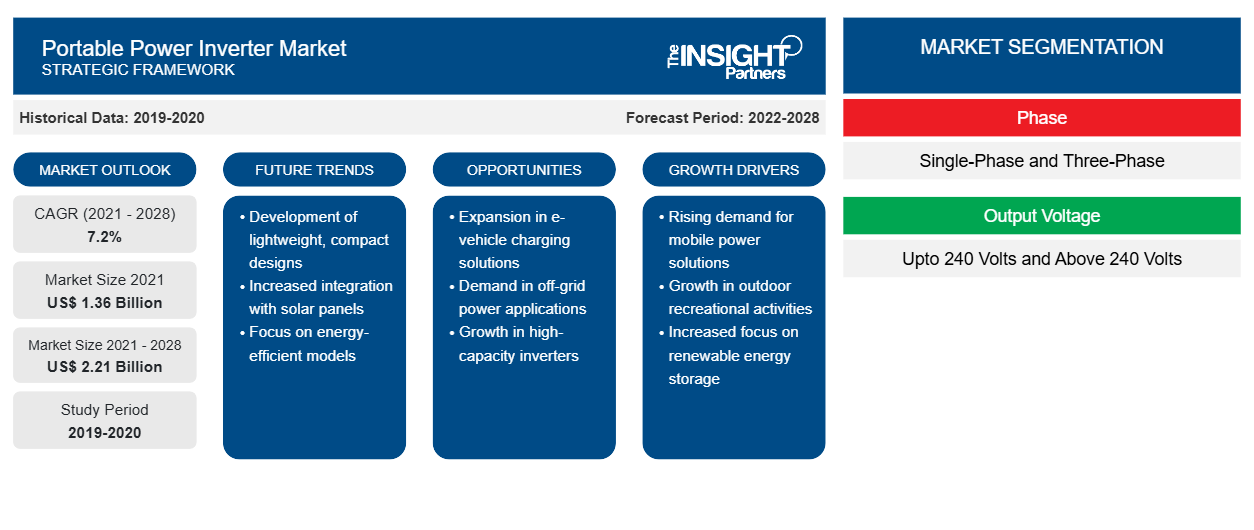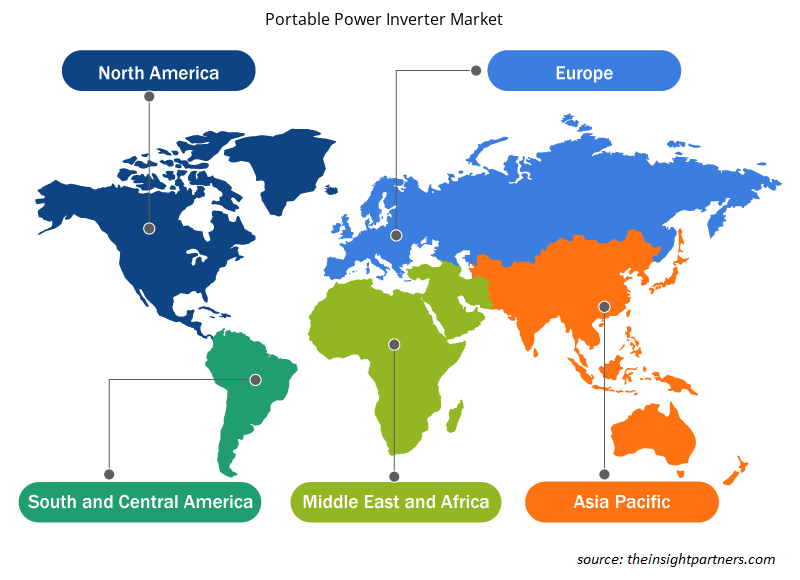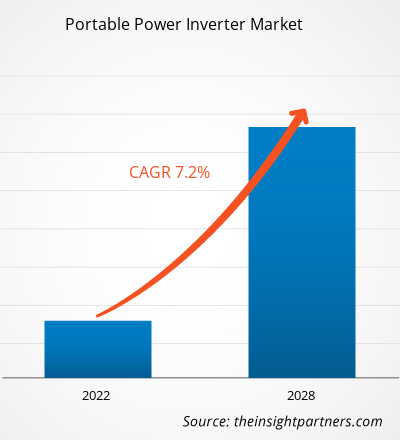The portable power inverter market is expected to grow from US$ 1,359.21 million in 2021 to US$ 2,206.57 million by 2028. It is estimated to rise at a CAGR of 7.2% from 2021 to 2028.
A power inverter changes DC power from a battery to conventional AC power that you can use to operate all kinds of devices. Inverters can be used to charge electrical devices using automobile batteries and other renewable energy sources, such as wind turbines and solar panels. Portable power Inverters are used in a wide range of automotive and manufacturing industries. They are powered by plugging into a socket, using a fuse panel, or directly connecting to the battery terminals. The rising penetration of electric vehicles, increasing commercial usage of recreational vehicles, the surging adoption of solar power, and the growing number of government initiatives to reduce the emission of Greenhouse Gas (GHG) are driving the portable power inverter market.
The reports cover critical developments in the portable power inverter market as organic and inorganic growth strategies. Various companies are focusing on organic growth strategies, such as product launches, product approvals, patents, and events. Inorganic growth strategies activities witnessed in the market have been acquisitions, partnerships, and collaborations. These activities have paved the way for the expansion of business and the customer base for market players. These players are anticipated to gain lucrative growth opportunities with the rising demand for portable power inverters over the next few years.
Customize This Report To Suit Your Requirement
You will get customization on any report - free of charge - including parts of this report, or country-level analysis, Excel Data pack, as well as avail great offers and discounts for start-ups & universities
Portable Power Inverter Market: Strategic Insights

- Get Top Key Market Trends of this report.This FREE sample will include data analysis, ranging from market trends to estimates and forecasts.
You will get customization on any report - free of charge - including parts of this report, or country-level analysis, Excel Data pack, as well as avail great offers and discounts for start-ups & universities
Portable Power Inverter Market: Strategic Insights

- Get Top Key Market Trends of this report.This FREE sample will include data analysis, ranging from market trends to estimates and forecasts.
Impact of COVID-19 Pandemic on Global Portable Power Inverter Market
Portable power inverters have been equipped with cutting-edge technologies, resulting in enhanced efficiency and a high level of system redundancy. They can provide a sustainable energy solution for a wide range of household and commercial applications. The lockdown imposed due to COVID-19 negatively impacted the growth of this market globally. With delays in producing new inverters, capacity expansion forecasts, and financial issues for the leading players' value chain, the market grew slowly during the pandemic. The demand for portable power inverters decreased significantly due to surplus electricity production as most employees were working from homes, and manufacturing plants were temporarily shut down. This had hampered by the portable power inverter market growth in 2020.
Portable Power Inverter Market Insights
Continuous Increase in Demand from Residential Sector
The adoption of inverters for personal usage in the residential sector has been around for decades. This factor is one of the major factors driving the growth of the portable power inverter market. In the current scenario, the attention toward portable power inverters has risen stupendously due to portability and lower energy consumption advantage. The increasing interest in varied models of these inverters is driving the market substantially. Further, the uptake of portable power inverters is foreseen to grow over the years, as procurement of solar PV portable inverters is rising among end users in the residential sector, propelling the portable power inverter market size.
The increase in the number of household appliances purchased worldwide is one of the key factors responsible for the rising demand for power inverters. Over the past couple of years, the work from home scenario has displayed an increase in the use of laptops, desktops, and other consumer electronics at homes, which require a continuous power supply. Due to this, the need for and uptake of portable power inverters has risen remarkably across the world, which is further catalyzing the portable power inverter market growth.
In recent years, the uncertainty of sudden power outages has reflected on the demand for power inverters in the residential sector. Thus, coupling the factors, such as portability, less power consumption, and the need for inverters to support electronics operations during power outages, has led to a rise in the uptake of power inverters, and more recently the portable versions of the power inverters. This is driving the portable power inverter market size.
Phase-Based Market Insights
Based on phase, the portable power inverter market is segmented as single-phase and three-phase. In 2021, the single-phase segment led the market. The adoption of single-phase inverters is gaining traction due to increased solar PV deployment for residential applications. The governments are offering incentives in the form of tax benefits and subsidiaries for residential sectors for incorporating renewable energy
Output Voltage - Based Market Insights
Based on the output voltage, the portable power inverter market is divided into up to 240 volts and above 240 volts. In 2021, the up to 240 volts segment accounted for the largest market share. Inverters provide the inverse function of "converters," which initially were big electromechanical devices that converted AC to DC. Even when the inverter's load changes, the AC output voltage of a power inverter is commonly controlled to be the same as the grid line voltage, which is typically 120 or 240 VAC at the distribution level.
Portable Power Inverter Market Regional Insights
The regional trends and factors influencing the Portable Power Inverter Market throughout the forecast period have been thoroughly explained by the analysts at The Insight Partners. This section also discusses Portable Power Inverter Market segments and geography across North America, Europe, Asia Pacific, Middle East and Africa, and South and Central America.

- Get the Regional Specific Data for Portable Power Inverter Market
Portable Power Inverter Market Report Scope
| Report Attribute | Details |
|---|---|
| Market size in 2021 | US$ 1.36 Billion |
| Market Size by 2028 | US$ 2.21 Billion |
| Global CAGR (2021 - 2028) | 7.2% |
| Historical Data | 2019-2020 |
| Forecast period | 2022-2028 |
| Segments Covered |
By Phase
|
| Regions and Countries Covered | North America
|
| Market leaders and key company profiles |
Portable Power Inverter Market Players Density: Understanding Its Impact on Business Dynamics
The Portable Power Inverter Market is growing rapidly, driven by increasing end-user demand due to factors such as evolving consumer preferences, technological advancements, and greater awareness of the product's benefits. As demand rises, businesses are expanding their offerings, innovating to meet consumer needs, and capitalizing on emerging trends, which further fuels market growth.
Market players density refers to the distribution of firms or companies operating within a particular market or industry. It indicates how many competitors (market players) are present in a given market space relative to its size or total market value.
Major Companies operating in the Portable Power Inverter Market are:
- Cobra Electronics Corporation
- ENERGIZER HOLDINGS, INC.
- Kisae Technology Inc.
- COTEK
- Rally Manufacturing
Disclaimer: The companies listed above are not ranked in any particular order.

- Get the Portable Power Inverter Market top key players overview
Application-Based Market Insights
Based on application, the portable power inverter market is segmented into residential, commercial, and industrial. In 2021, the residential segment accounted for the largest market share. With the increasing adoption of solar PVs by residential users, companies are offering inverters with advanced capabilities. For instance, in May 2020, Huawei Technologies Co., Ltd. announced the launch of Smart Energy Controllers, a one-phase and a three-phased inverter with AI-powered arcing protection technology for residential applications.
The players operating in the portable power inverter market adopt strategies, such as mergers, acquisitions, and market initiatives, to maintain their positions in the market. A few developments by key players are listed below:
- In September 2020, Ring announced that two of its products were awarded in the inverter test in the latest edition of Auto Express. The RINVU300 PowerSource 300W Compact Inverter won the Best Buy award and retained its crown, with the RINVU500 PowerSource 500W Compact Inverter getting a recommendation.
- In January 2022, Eaton and Samsung are accelerating the opportunity with a new partnership to extend the home energy management and monitoring capabilities of Samsung's SmartThings Energy platform.
Company Profiles
The key players operating in the portable power inverter market include; Cobra Electronics Corporation; ENERGIZER HOLDINGS, INC.; Kisae Technology Inc.; COTEK; Rally Manufacturing; EXELTECH; OSRAM GmbH; Ring Automotive Ltd.; Growatt New Energy; and Eaton. Several other players across geographies were also studied to understand the overall scenario of the portable power inverter market.
Frequently Asked Questions
What trends are expected to drive the demand for various portable power inverter markets?
The adoption of inverters for personal usage in the residential sector has been around for decades. In the current scenario, the attention toward portable power inverters has risen stupendously due to portability and lower energy consumption advantage. The increase in attraction toward varied models of these inverters is driving the market substantially. Further, the uptake of portable power inverters is foreseen to grow over the years, as procurement of solar PV portable inverters is rising end-users users in the residential sector, propelling the market. The increase in the number of household appliances purchased worldwide is one of the key factors responsible for the growth in demand for power inverters.
Which region is expected to dominate the portable power inverter market in the forecast period 2028?
The Asia Pacific is estimated to be the prominent region for product manufacturing due to the rise in industrialization and urbanization. Increasing automotive and manufacturing industries in the APAC region, especially in countries such as China, India, and Japan, are also expected to give a significant boom to factory automation and industrial control solutions. China and India are the fastest-growing economies in the Asia Pacific. Moreover, the industries in these countries have witnessed some evolutionary changes in the past few decades in the region in terms of its application in manufacturing plants, transport industry, and other critical infrastructural application areas, which are driving the growth of the portable power inverter market in the region.
Which power is expected to dominate the market in the forecast period 2028?
Based on power, the portable power inverter market is segmented as 1000W to 2500W and 2500W to 5000W. The 1000W to 2500W segment continues to hold the largest share in the global portable power inverter market throughout the forecast period. The key reason behind the dominance is the significant demand for the same among the residential and commercial sectors. Owing to this, manufacturers of portable power inverters are also designing and developing robust power inverters within a range of 1000W to 2500W power.
Which application is expected to dominate the market during the forecast period 2028?
Based on application, the portable power inverter market is segmented as residential, commercial, and industrial. The residential segment dominates the global portable power inverter market, while the commercial segment is expected to be the fastest revenue-generating segment during the forecast period. The growing commercialization across countries worldwide is one of the key catalyzers of the portable power inverter market. Commercial spaces such as restaurants, individual office spaces, vehicle maintenance stores, as well as retail stores are procuring portable power inverters in order to avoid any disruption during a sudden power outage. This trend is foreseen to drive the portable power inverter market through the commercial segment.
What are the market opportunities for the market?
The rapid increase in energy demands necessitates utilizing alternative energy sources. Carbon emissions are strongly linked to traditional energy sources based on fossil fuels, such as coal and petroleum. As a result, renewable energy sources, especially solar energy, are now being used to generate electricity. The increasing uptake of solar energy for electricity generation is expected to drive the demand for portable power inverters in the years to come. The rising concerns about global warming and increasing measures to minimize dependency on fossil fuels are also leading to increased solar energy adoption several countries are attempting to build large solar power-producing facilities to harness solar energy. The demand for solar inverters is increasing due to the surge in the application of large-scale devices that store solar energy for later use. These factors are expected to offer lucrative opportunities to market players during the forecast period.
What are the factors driving the growth of the portable power inverter market growth?
Solar power inverters are essential components of solar power systems. Solar power plants generate DC power, which is incompatible with common household appliances. As a result, this DC power must be converted to AC power. The fluctuating DC output of PV solar panels is converted to usable AC by solar inverters. Residential, PV plants, and commercial end users can use this AC to power electric appliances and devices. Commercial solar systems are installed on rooftops or the ground, allowing clients to create renewable energy while taking advantage of various government incentives. PV systems on a commercial scale generate green energy and save money on electricity costs and drive market growth.
- Historical Analysis (2 Years), Base Year, Forecast (7 Years) with CAGR
- PEST and SWOT Analysis
- Market Size Value / Volume - Global, Regional, Country
- Industry and Competitive Landscape
- Excel Dataset
Testimonials
Reason to Buy
- Informed Decision-Making
- Understanding Market Dynamics
- Competitive Analysis
- Identifying Emerging Markets
- Customer Insights
- Market Forecasts
- Risk Mitigation
- Boosting Operational Efficiency
- Strategic Planning
- Investment Justification
- Tracking Industry Innovations
- Aligning with Regulatory Trends
Yes! We provide a free sample of the report, which includes Report Scope (Table of Contents), report structure, and selected insights to help you assess the value of the full report. Please click on the "Download Sample" button or contact us to receive your copy.
Absolutely — analyst assistance is part of the package. You can connect with our analyst post-purchase to clarify report insights, methodology or discuss how the findings apply to your business needs.
Once your order is successfully placed, you will receive a confirmation email along with your invoice.
• For published reports: You’ll receive access to the report within 4–6 working hours via a secured email sent to your email.
• For upcoming reports: Your order will be recorded as a pre-booking. Our team will share the estimated release date and keep you informed of any updates. As soon as the report is published, it will be delivered to your registered email.
We offer customization options to align the report with your specific objectives. Whether you need deeper insights into a particular region, industry segment, competitor analysis, or data cut, our research team can tailor the report accordingly. Please share your requirements with us, and we’ll be happy to provide a customized proposal or scope.
The report is available in either PDF format or as an Excel dataset, depending on the license you choose.
The PDF version provides the full analysis and visuals in a ready-to-read format. The Excel dataset includes all underlying data tables for easy manipulation and further analysis.
Please review the license options at checkout or contact us to confirm which formats are included with your purchase.
Our payment process is fully secure and PCI-DSS compliant.
We use trusted and encrypted payment gateways to ensure that all transactions are protected with industry-standard SSL encryption. Your payment details are never stored on our servers and are handled securely by certified third-party processors.
You can make your purchase with confidence, knowing your personal and financial information is safe with us.
Yes, we do offer special pricing for bulk purchases.
If you're interested in purchasing multiple reports, we’re happy to provide a customized bundle offer or volume-based discount tailored to your needs. Please contact our sales team with the list of reports you’re considering, and we’ll share a personalized quote.
Yes, absolutely.
Our team is available to help you make an informed decision. Whether you have questions about the report’s scope, methodology, customization options, or which license suits you best, we’re here to assist. Please reach out to us at sales@theinsightpartners.com, and one of our representatives will get in touch promptly.
Yes, a billing invoice will be automatically generated and sent to your registered email upon successful completion of your purchase.
If you need the invoice in a specific format or require additional details (such as company name, GST, or VAT information), feel free to contact us, and we’ll be happy to assist.
Yes, certainly.
If you encounter any difficulties accessing or receiving your report, our support team is ready to assist you. Simply reach out to us via email or live chat with your order information, and we’ll ensure the issue is resolved quickly so you can access your report without interruption.















The List of Companies - Portable Power Inverter Market
- Cobra Electronics Corporation
- ENERGIZER HOLDINGS, INC.
- Kisae Technology Inc.
- COTEK
- Rally Manufacturing
- EXELTECH
- OSRAM GmbH
- Ring Automotive Ltd.
- Growatt New Energy
- Eaton






 Get Free Sample For
Get Free Sample For